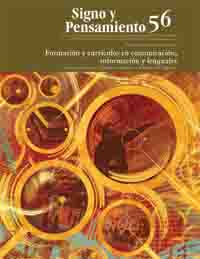Abstract
This work seeks to explain and promote the presence of humanistic studies in a school of communication, specifically, in the School of Communication and Languages at Pontificia Universidad Javeriana. It shows a reflection and a proposal for undergraduate study programs through the incorporation of humanities, a component that serves as a basis for the construction and development of both disciplinary and professional training. Human science studies are of paramount importance for the professional practice of communicators, journalists, language teachers, or information scientists. Additionally, they foster plural and multi-dimensional thinking in students, thus enabling them to embrace perspectives and realities other than their own.
Coetzee, J. (2001), Elizabeth Costello, Barcelona, Mondadori.
Ferraris, M. (2005), Dove sei: ontologia del telefonino, Milán, Bompiani.
Morin, E. (1993), Tierra-Patria, Barcelona, Kairós. — (2006), Breve historia de la barbarie de la humanidad, Barcelona, Paidós.
— (2008), Introducción al pensamiento complejo, Barcelona, Gedisa.
Nussbaum, M. (2001), El cultivo de la humanidad, Barcelona, Paidós.
Sloterdijk, P. (2006), Normas para el parque humano, Madrid, Siruela.
Steiner, G. (2008), Los libros que nunca he escrito, Madrid, Siruela.
Treviño, P. (2000), “Apuntes para una noción de la modernidad”, en: Zeraoui, Z. (comp.), Modernidad y posmodernidad: la crisis de los paradigmas y valores, México, Limusa.
This journal is registered under a Creative Commons Attribution 4.0 International Public License. Thus, this work may be reproduced, distributed, and publicly shared in digital format, as long as the names of the authors and Pontificia Universidad Javeriana are acknowledged. Others are allowed to quote, adapt, transform, auto-archive, republish, and create based on this material, for any purpose (even commercial ones), provided the authorship is duly acknowledged, a link to the original work is provided, and it is specified if changes have been made. Pontificia Universidad Javeriana does not hold the rights of published works and the authors are solely responsible for the contents of their works; they keep the moral, intellectual, privacy, and publicity rights.
Approving the intervention of the work (review, copy-editing, translation, layout) and the following outreach, are granted through an use license and not through an assignment of rights. This means the journal and Pontificia Universidad Javeriana cannot be held responsible for any ethical malpractice by the authors. As a consequence of the protection granted by the use license, the journal is not required to publish recantations or modify information already published, unless the errata stems from the editorial management process. Publishing contents in this journal does not generate royalties for contributors.


